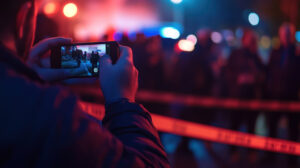Legally Reviewed By:
Brian P. Gabriel, Esquire
 Filming police officers has become a powerful tool for transparency and accountability, but it’s not without legal gray areas. In Florida, as in many states, you generally have the right to record public officials in public spaces, but certain actions during recording could lead to legal issues.
Filming police officers has become a powerful tool for transparency and accountability, but it’s not without legal gray areas. In Florida, as in many states, you generally have the right to record public officials in public spaces, but certain actions during recording could lead to legal issues.
If you were accused of a crime while filming police officers, understanding your rights and the legal boundaries is crucial. Recording law enforcement in public is generally protected, but allegations of obstruction or interference can complicate matters. With over 30 years of criminal defense experience, Criminal Defense Attorney Brian Gabriel has successfully guided clients through complex legal situations involving constitutional rights and criminal charges, offering the clarity and support needed to address these challenges.
What You Should Know About Filming Police Officers in Florida
Under the First Amendment, you have the right to record public officials, including police officers, while they are performing their duties in public spaces. This right serves as a check on government power and promotes accountability. However, your right to film is not unlimited. You must not interfere with an officer’s duties or violate other laws while recording. For example, stepping into a crime scene, obstructing an investigation, or ignoring police instructions could lead to legal trouble.
While filming police officers is generally legal, certain actions during or after recording could result in charges. Common accusations include:
- Obstruction of justice: If police allege that your filming interfered with their duties, they may charge you with obstruction. This often depends on how close you are to the scene and whether your actions impede their ability to perform their duties.
- Disorderly conduct: Loud or disruptive behavior while recording could lead to disorderly conduct charges, especially if it creates a public disturbance.
- Wiretapping violations: Florida is a two-party consent state, meaning you cannot record audio of someone without their consent in private settings. This typically does not apply to police in public spaces but is worth noting in certain circumstances.
Filming police officers is an important way to promote accountability, but respecting legal limits ensures you don’t face charges like obstruction or disorderly conduct.
What to Do If You’re Arrested While Filming Police
If you’re arrested while filming police officers, remain calm. Being respectful and cooperative with law enforcement during an arrest is crucial. Avoid arguing or resisting, as this can lead to additional charges like resisting arrest or disorderly conduct.
Under the Fifth Amendment, you have the right to remain silent. Politely inform the officers that you are invoking this right and avoid making statements without legal counsel present. Anything you say can be used against you in court.
If possible, note the names or badge numbers of the officers involved. If your phone or recording device is confiscated, remember that law enforcement typically requires a warrant to access your private data. Your attorney can address any potential violations of your rights.
After your arrest, reach out to a criminal defense attorney as soon as possible. An attorney with experience in constitutional rights cases can evaluate the circumstances of your arrest, determine whether your rights were violated, and build a strong defense on your behalf.
Protect Your Rights With Criminal Defense Attorney Brian Gabriel
Accusations of a crime while filming police officers can have significant legal consequences, especially if charges like obstruction of justice or disorderly conduct are involved. Criminal Defense Attorney Brian Gabriel, with over 30 years of experience in criminal defense, understands the complexities of cases involving constitutional rights. His in-depth knowledge of Florida law and dedication to protecting individual freedoms make him a trusted advocate for those facing these challenges.
Start with a free consultation today by calling Criminal Defense Attorney Brian Gabriel of The Law Office of Gabriel & Gabriel at (561) 622-5575. You can also complete an online contact form to learn more.



